|
|
|
Sort Order |
|
|
|
Items / Page
|
|
|
|
|
|
|
| Srl | Item |
| 1 |
ID:
092930
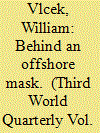

|
|
|
|
|
| Publication |
2009.
|
| Summary/Abstract |
This study of global financial flows and offshore financial centres (OFCs) draws on the concept of nomadology as developed by Gilles Deleuze and Felix Guattari to argue that OFCs not only facilitate the circulation of global capital, but also serve to create the means for identity arbitrage. This concept highlights the use of the offshore in order to benefit from the variety of preferential measures offered to foreign firms and investment capital. State sovereignty authorises legislation by regimes to attract and regulate foreign investment. International banking statistics are examined for indications of the use of and impact from exploiting the offshore to establish a different national identity in pursuit of the greatest available return on investment. The paper concludes that the design of legislation by onshore states is just as complicit in the positive and negative effects of the offshore economy as are the small sovereign economies that host an OFC.
|
|
|
|
|
|
|
|
|
|
|
|
|
|
|
|
| 2 |
ID:
092921
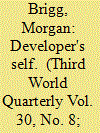

|
|
|
|
|
| Publication |
2009.
|
| Summary/Abstract |
Recent development studies literature has begun to consider the developer's self. This welcome enlargement of the field deserves to be deepened and extended by moving beyond opposition to post-development critics, and by articulating an explicit theoretical frame for examining developers' selves. By exploring Foucault's suggestion that modern approaches to knowledge and selfhood may be entwined through developmentalism, this paper proposes a flexible and non-deterministic cultural-historical framework for considering developers' selves. Foucault's analyses of relations of power and subjectivity provide strategies for examining developers' selves, but this does not suggest that such selves can be read off the proposed framework. Examining developers' selves is necessarily a reflective ethical task, and one which requires engaging the external relations that constitute the self. Foucault provides valuable resources for this task, but there is also a need to extend upon and complement a Foucauldian approach. Pursuing our new-found interest in developers' selves by working through and beyond Foucault promises to open new professional futures and possibilities for development practice.
|
|
|
|
|
|
|
|
|
|
|
|
|
|
|
|
| 3 |
ID:
092924
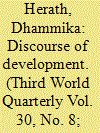

|
|
|
|
|
| Publication |
2009.
|
| Summary/Abstract |
Like most other concepts in the social sciences, 'development' does not entail a commonly agreed upon meaning, context or programme of action. It is defined in different ways depending on the time, space, context, professional and organisational interests of the one who does the business of defining. The meaning of development has also undergone a remarkable transformation over the course of history from the Enlightenment concept of 'Progress' to encompass a great variety of human needs. This paper analyses how the contemporary discourse of development has reached a mature state and how it enables us to understand development in context- and culture-sensitive ways. It is now possible to determine what development means in different settings, and how to bring in material and non-material prosperity to people living in different contexts and cultures. After a theoretical discussion an empirical study in Sri Lanka is presented which attempts to arrive at a more refined context- and culture-sensitive definition of development. The paper argues that, in order to understand development at micro-settings, it is better to construct our own indexes of development rather than using global measures. It shows how the current state of the discourse of development can lend insights into construction of a development index.
|
|
|
|
|
|
|
|
|
|
|
|
|
|
|
|
| 4 |
ID:
092936


|
|
|
|
|
| Publication |
2009.
|
| Summary/Abstract |
Official corruption is frequently associated with the abundance of valuable extractive resources. This article reviews the worst cases of 'resource curse' in Africa-Angola, Republic of Congo, Democratic Republic of Congo, Equatorial Guinea, Gabon, and Nigeria-in light of the most recent developments. Despite its systematic association with public corruption, however, mineral wealth is neither a necessary nor a sufficient condition. Corruption is widespread in resource-poor countries as well-in Africa and elsewhere-and some resource-rich African countries such as Botswana have a record of good economic performance and high public integrity, suggesting specific ways in which transparency and accountability for the use of mineral resources can be encouraged and corruption correspondingly reduced. Because corruption in resource-rich African countries is heavily influenced by external interests, particularly the multinational extractive industries, recent initiatives by the United States and the international community to foster transparency carry a significant potential for reducing corruption and improving governance.
|
|
|
|
|
|
|
|
|
|
|
|
|
|
|
|
| 5 |
ID:
092934
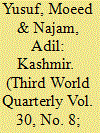

|
|
|
|
|
| Publication |
2009.
|
| Summary/Abstract |
This paper documents and analyses 46 proposals made between 1947 and 2008 for resolving the India-Pakistan dispute over Jammu and Kashmir. We conduct a content analysis to recognise the patterns that emerge from these formulations and identify the key elements that recur over time. Our analysis suggests that the dispute may be more 'ripe' for resolution today than it has ever been in the past. For the first time in the dispute's history, there is growing convergence over a core element of the solution, ie granting autonomy to Kashmiris. This is matched by a virtual consensus on the 'catalysts', namely soft borders to allow relatively free human and economic exchange within Jammu and Kashmir, the notion of Kashmiri involvement in any negotiations on the issue and demilitarisation of the state. Ripeness alone, however, does not lead to resolution. Over the years various dynamic proposals have been made, which means that this particular convergence could also dissipate, as some of the prior ones have. There is a potential window of opportunity today, but it will not last indefinitely.
|
|
|
|
|
|
|
|
|
|
|
|
|
|
|
|
| 6 |
ID:
092932
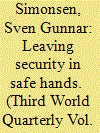

|
|
|
|
|
| Publication |
2009.
|
| Summary/Abstract |
Built by outside powers and targeted against local insurgents, the new national armies of Afghanistan and Iraq are fragile institutions. The legitimacy of these forces is limited in the deeply divided societies in which they exist. Whereas low levels of legitimacy exert a disintegrative pressure upon an army, cohesion counterweighs such pressure. This article engages the theory of military unit cohesion for the purpose of increasing understanding of the challenges to cohesion faced by the new armies of Afghanistan and Iraq. Two main sources of legitimacy for the new armies are discussed: the (ethnic/sectarian) composition of the forces, and their respective missions. Challenges to cohesion are found to depend on how soldiers are recruited and units composed: ethnically/sectarian mixed units may disintegrate because of weak horizontal cohesion; homogeneous units (particularly when recruited as groups and not individually) may splinter off because of weak vertical cohesion. The article also argues that promoting an image of the army as 'national' within a society may reduce disintegrative pressures.
|
|
|
|
|
|
|
|
|
|
|
|
|
|
|
|
| 7 |
ID:
092940


|
|
|
|
|
| Publication |
2009.
|
| Summary/Abstract |
Military coups and coup attempts, as well as the establishment, or continuation, of economic/social development roles for the military far outside traditional security missions have been a part of civil-military relations in Ecuador and Venezuela since 1990. The military's greater role in Ecuador and Venezuela has in part been a consequence of the failure of neoliberal and globalist policy coalitions to establish and maintain a hegemonic consensus over political power and national policy. This failure has undermined progress in orienting the military in a 'democratic' direction that prioritises traditional security roles under the ultimate command of civilian authorities. It has also allowed for competing models of civil-military relations to emerge that draw upon nationalist or socialist models of military power and democracy.
|
|
|
|
|
|
|
|
|
|
|
|
|
|
|
|
| 8 |
ID:
092923


|
|
|
|
|
| Publication |
2009.
|
| Summary/Abstract |
This paper offers a critique of the picture of world growth and world inequality generally disseminated by international agencies. The positive view commonly presented depends on the widespread consensus that economic performance should be measured using 'Purchasing Power Parity' (PPP) statistics, instead of market exchange rates. Although originally conceived narrowly as a basis for comparing living standards, PPP indicators are now indiscriminately promoted as an unexceptionable standard for comparing and aggregating national income statistics. This article highlights the flaws in the PPP approach by accepting the claims made on their behalf at face value. It shows that, even on the basis of these claims, the wrong conclusions have been drawn. By comparing PPP and market exchange rate measures of inequality it shows that what really took place, at the end of the last century, was a systematic reduction in the prices of consumption goods in the Third World. PPP statistics have concealed this underlying and unsustainable trend, allowing it to be packaged as a stable reduction in poverty. Neither genuine growth, nor lasting poverty reduction was achieved over this period. The fall in the price of consumer goods masked a systematic failure to overcome the central problem of development-the high price of capital goods, which PPP statistics understate, and of intermediate goods, which they completely omit.
|
|
|
|
|
|
|
|
|
|
|
|
|
|
|
|
| 9 |
ID:
092919


|
|
|
|
|
| Publication |
2009.
|
| Summary/Abstract |
This paper takes issue with global justice theory, seeing it as a 'global-local' in which the perspectives and demands of post-Kantian Western liberalism silence ways of being in the world that move beyond a narrowly circumscribed definition of 'reasonableness'. Taking its cue from critics of dominant liberal conceptions of the self, such as Spivak, Deleuze and Freire, the paper examines the impact of epistemological diversity and the radical 'otherness' of indigenous, peasant and marginal epistemologies on how Western intellectuals might think about global justice. We look at a number of examples of indigenous and marginal resistance to injustice in the global system, including the West Papuan and Zapatista movements, and conclude that the goals of such movements cannot be encapsulated in distributive or juridical terms. An alternative theorisation of global justice might, contra global justice theory, insist on a dialogical, contingent basis for discussing justice, whether local or global.
|
|
|
|
|
|
|
|
|
|
|
|
|
|
|
|
|
|
|
|
|